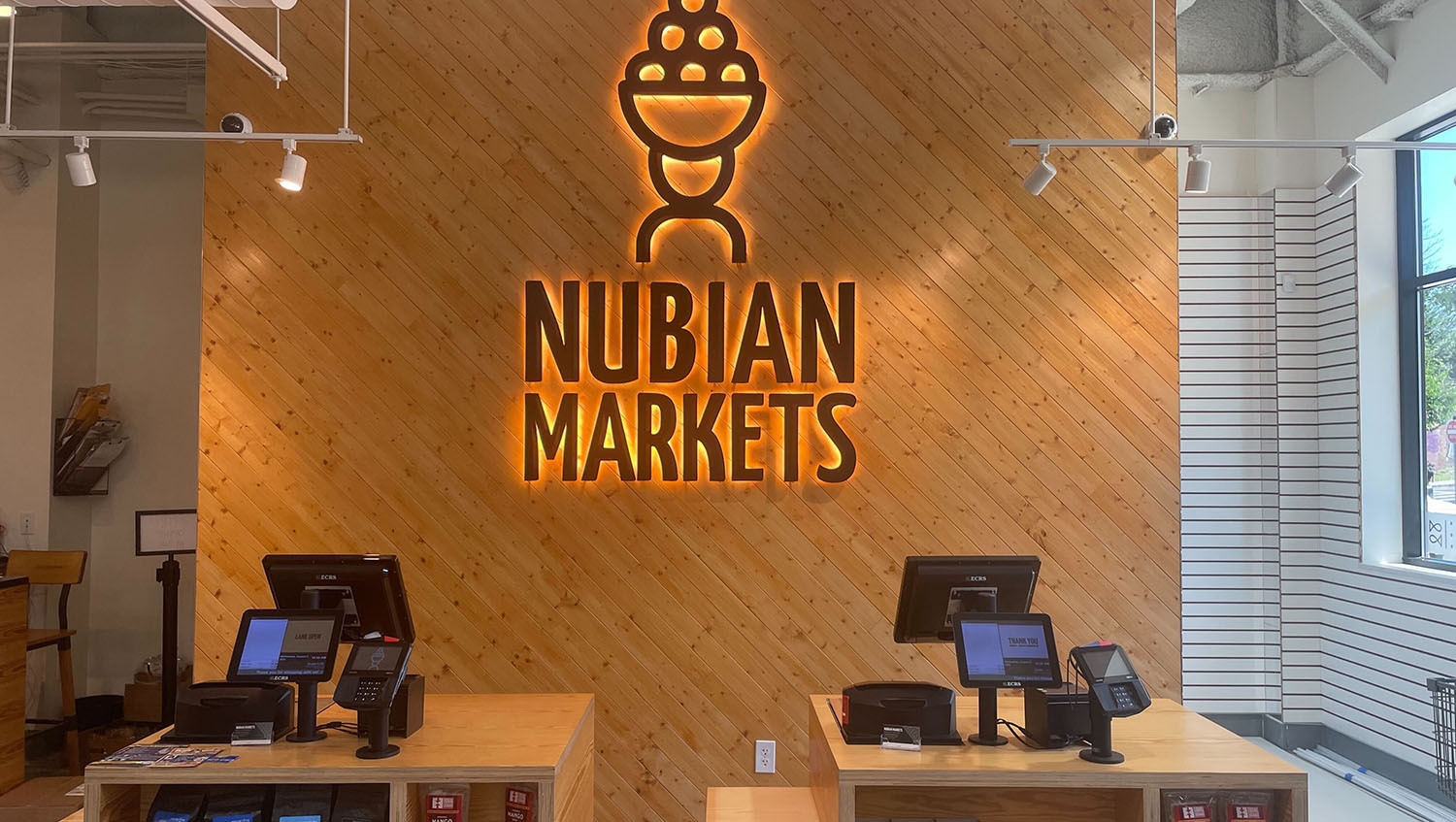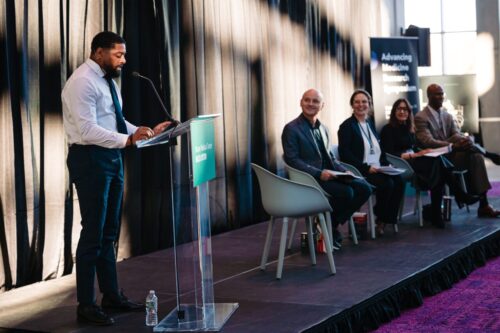Bringing Healthy Food and a Community Hub to Roxbury
August 3, 2023

Boston Medical Center
With flavors from the African diaspora and an abundance of locally made products, Nubian Markets serves and supports its diverse community.
There’s a new Black-owned grocery, café, halal butcher, and gathering space in Boston’s Roxbury neighborhood. Embedded in the mixed-income residential and retail developments of this historic neighborhood of Boston, Nubian Markets is a community hub where food and culture intersect.
Co-owners Ismail Samad and Yusuf Yassin drew on their African American and East African roots and Muslim faith to create food options that would resonate with people in the diverse neighborhood.
“We feature food from North Africa, West Africa, Central, South Africa, the Caribbean, and the African American experience,” explains Samad, who functions as chef and visionary, while partner Yassin is on the ground running day-to-day operations.
The café menu includes a variety of dishes: chickpea peanut stew, sandwiches of peri peri chicken or black-eyed pea fritter on house-made honey tumeric pita bread, and ginger beef with injera, a spongy flatbread popular in Ethiopia and Eritrea. Samad has devised some unique twists on French pastries, too: “We’re putting plantains in our croissants. We’re putting sweet potato ginger in our croissants. We’re putting collard greens and cheddar in our croissants — adding things that are familiar to our community,” he says.
Nubian Markets’ multi-faceted mission
With a recent Boston Public Health Commission report showing that Nubian Square residents have an average life expectancy 23 years shorter than those in the city’s more affluent Back Bay neighborhood, access to affordable nutritious foods is a health equity matter. But offering fresh, high-quality, and culturally relevant food is only one part of a larger plan for the new business.
A key goal is to support communities of color economically. One way Nubian Markets does this is by hiring from the local community. The other is by seeking out and selling products specifically from different communities of color, with particular intent centered on Black communities. Both Samad and operations manager Roz Freeman worked previously for Commonwealth Kitchen, a Boston incubator for food entrepreneurs. Now, they can offer some of those up-and-coming enterprises prominent space for their creations — something rarely possible at larger stores.
Samad says, “We are really acting as an anchor for them, creating premium shelf space — so, moving A1 steak sauce down and putting Hillside Harvest Caribbean hot sauces on the middle shelf.
Freeman adds, “Before, I would be in conversations with [a large grocery chain], trying to negotiate the margin they were taking, and they’d be like, ‘You know what? Our margin is 37%. We can’t do anything about it.’ But here, we’re much more willing to take a hit on the small business products to make them more affordable and get a bigger margin on some other products, to make it work for these local entrepreneurs.”
Another goal is to provide the sort of community hub and gathering place residents have long desired. With that in mind, Nubian Markets has a dedicated meeting room for private and public events, as well as space to sit and enjoy food at the café.
Through it all, Samad says, they want to make everyone feel welcome, from legacy residents who have been in the neighborhood for decades to younger generations exploring and discovering their favorite foods and helping preserve the culture of Nubian Square. Nubian Market invites people across all ages and through a wide spectrum of incomes.
“Roz and the grocery team have done a good job of stocking some things that are affordable and some things that are typical in a higher-end market,” Samad says. “We’re trying to let people know that we all can shop in the same space, one that allows everyone to feel welcome.”
Nubian Markets’ grand opening on May 17 drew a crowd of local residents and elected officials.
“People are excited. They’re saying they feel very blessed that we’re here,” says Samad. “One person said, ‘You made me believe in my neighborhood.'”
Freeman says, “Another sentiment I heard is, ‘I’ve lived here for most of my life, and you guys are bringing out everybody. That’s not a thing I often see. You’re really bringing out everyone.'”
A diverse and evolving neighborhood
Roxbury has long been the heart of Boston’s African American community, with Nubian Square its commercial and transit hub. Over the past few decades, local Latinx, white, and African and Caribbean immigrants populations have grown. A recent market analysis found that 30% of Nubian Square businesses are immigrant-owned. The nearby Islamic Society of Boston Cultural Center opened in 2009, and its mosque serves 1,500 congregants. Nubian Square also has experienced a wave of new development, and while Roxbury still holds more affordable housing than any other Boston neighborhood, it has also seen rising home and condo prices as the city grows and new Bostonians seek housing.
The transformation of a former MBTA bus yard into the Bartlett Place mixed-use residential/retail development has been in the works for more than a decade. From early on, project plans included some form of grocery store along with 300-plus affordable and market-rate residential units. At one point, plans included a Washington, D.C.-based grocery store that would employ only Yassin as manager. But Yassin and Samad sought ownership — of the property and the business — and their aspiration matched a long-stated community desire to have Roxbury’s spate of development bring both local jobs and wealth-building opportunities.
Help from Boston Medical Center
Despite the hurdles that come with finding seed money for a start-up fund and the harsh reality that many entrepreneurs of color face barriers when accessing business financing, Samad and Yassin persisted with their vision.
They found Boston Medical Center, whose campus is less than a mile from Nubian Square, was able to provide a $1 million loan to help Nubian Markets get on its feet. The funding is part of BMC’s overall commitment to addressing social determinants of health (SDoH) — non-medical factors in people’s lives that affect health outcomes — including a $6.5 million initiative to support affordable and stable housing initiatives.
BMC had launched a community health initiative in 2017 that included listening to members of the hospital’s local Roxbury community. “People wanted a grocery store. They wanted a place where they would meet their neighbors. And they wanted to have a café and ready-made meals they could take home after work,” says BMC pediatrician Megan Sandel, MD, MPH.

“The perception was that a community in Roxbury couldn’t support a grocery store economically, and therefore, it was too risky and you couldn’t get financing,” Sandel says. “But BMC wanted to invest in Black entrepreneurs — so we leaned in with a $1 million no-interest loan.”
Among the recognized SDoH are stable housing, healthy food access, and financial wellbeing. The Nubian Markets project — adjacent to new affordable housing, offering healthy food options, supporting racially and ethnically diverse food producers, and Black-owned and operated — would cover all those essential components to help the community thrive.
Thea James, MD, BMC’s vice president of mission, explains, “Nubian Markets had great intentionality. It really was a deal-breaker if they could not own the business and own the physical space, because that is where the opportunity for generational wealth-building is.”
With Nubian Markets now up and running, Petrina Martin Cherry, BMC’s vice president of community engagement and external affairs, remarked on the overwhelming positive vibe when she stopped in for a bite.

“People drinking coffee, having lunch, buying from the butcher — it’s bustling. It’s just amazing,” Cherry says. “What we’ve created is not just a model for economic mobility, and not just this incredible Black business, and not just a place where other Black businesses can find success. It’s all that. But it is also a place for Black people to come in and feel a sense of community and ownership and pride. That BMC had a hand in it, we should all be proud of that. And it will be great to see us replicate that again and again.”


